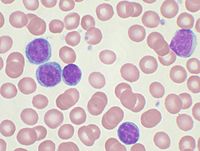
Photo from wikipedia
Immunomorphological diagnosis of T-cell lymphomas (TCL) may be challenging, especially on needle biopsies. Multiplex polymerase chain reaction (PCR) assays to assess T-cell receptor (TCR) gene rearrangements are now widely used… Click to show full abstract
Immunomorphological diagnosis of T-cell lymphomas (TCL) may be challenging, especially on needle biopsies. Multiplex polymerase chain reaction (PCR) assays to assess T-cell receptor (TCR) gene rearrangements are now widely used to detect T-cell clones and provide diagnostic support. However, PCR assays only detect 80% of TCL, and clonal lymphocyte populations may also appear in non-neoplastic conditions. More recently, targeted next-generation sequencing (t-NGS) technologies have been deployed to improve lymphoma classification. To the best of our knowledge, the comparison of these techniques' performance in TCL diagnosis has not been reported yet. In this study, 82 TCL samples and 25 non-neoplastic T-cell infiltrates were divided into two cohorts (test and validation) and analyzed with both multiplex PCR and t-NGS to investigate TCR gene rearrangements and somatic mutations, respectively. The detection of mutations appeared to be more specific (100.0%) than T-cell clonality assessment (41.7% to 45.5%), whereas no differences were observed in terms of sensitivity (95.1% to 97.4%). Furthermore, t-NGS provided a reliable basis for TCL diagnosis in samples with partially degraded DNA that was impossible to assess with PCR. Finally, although multiplex PCR assays appeared to be less specific than t-NGS, both techniques remain complementary, as PCR recovered some t-NGS negative cases.
Journal Title: Blood advances
Year Published: 2021
Link to full text (if available)
Share on Social Media: Sign Up to like & get
recommendations!